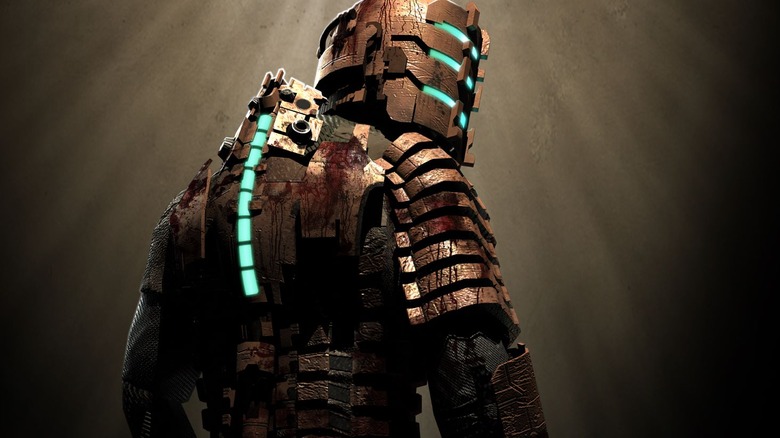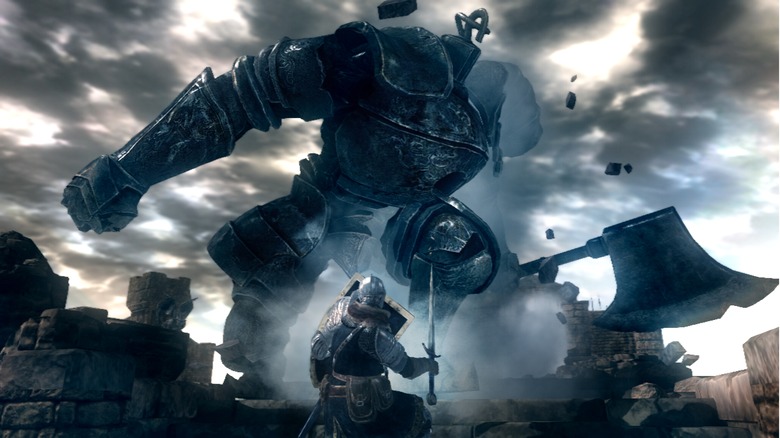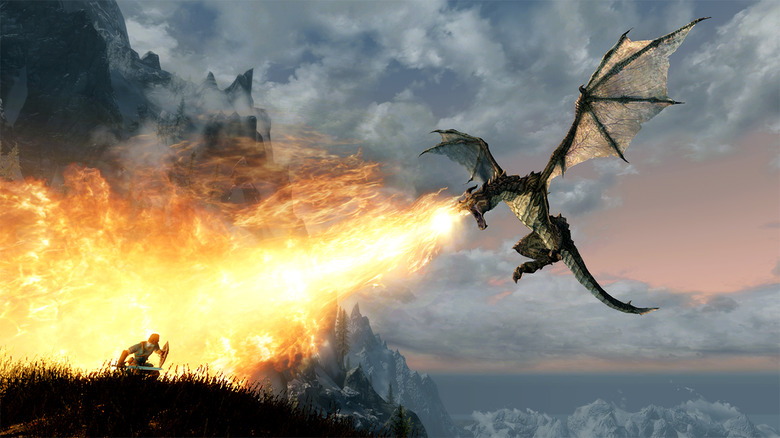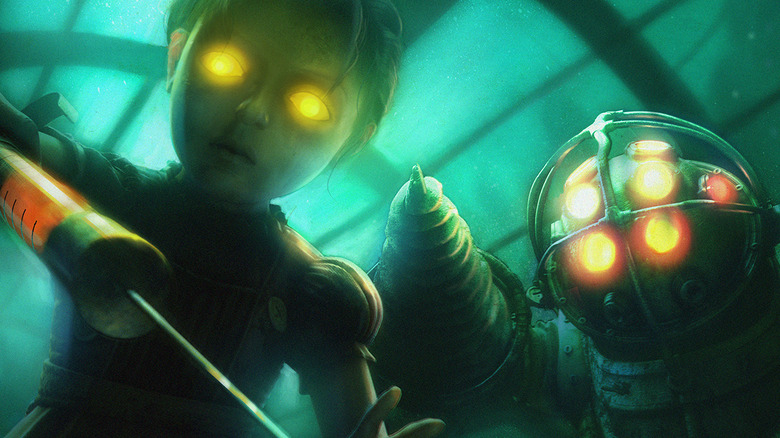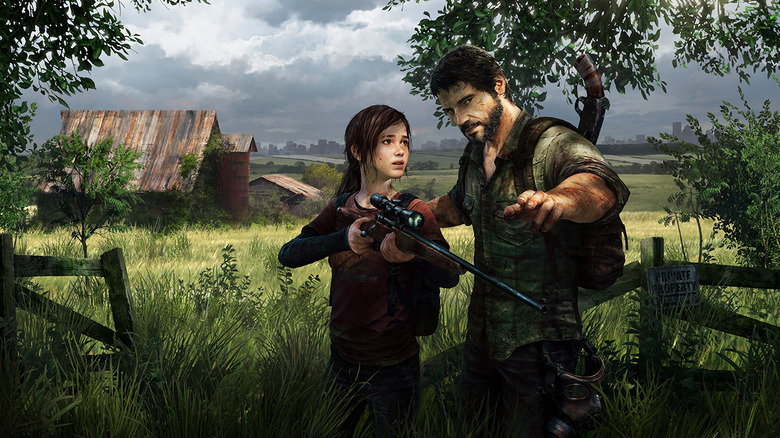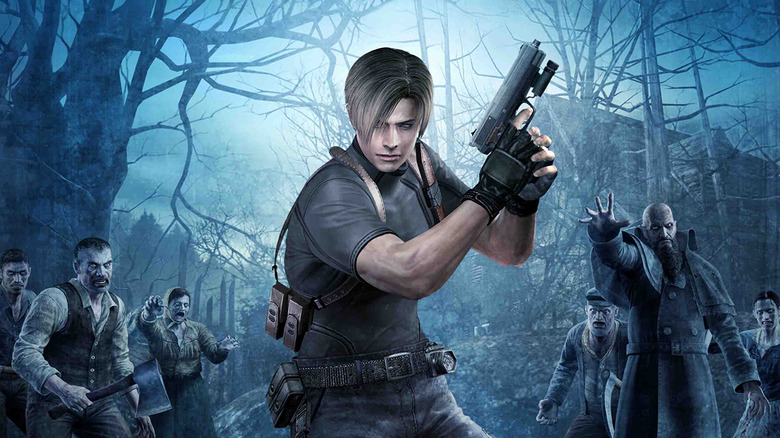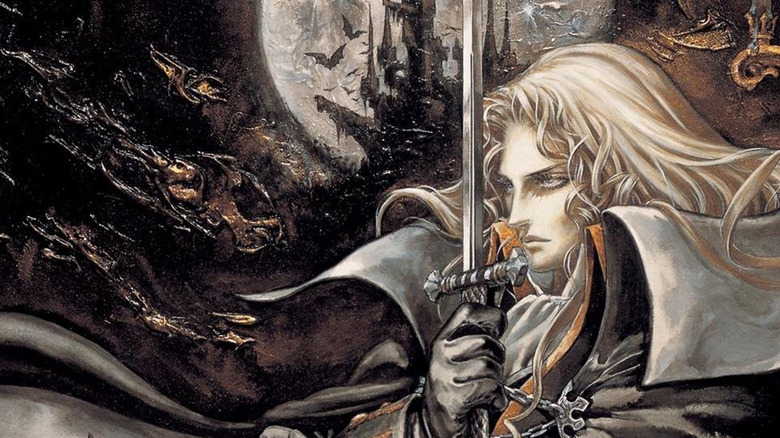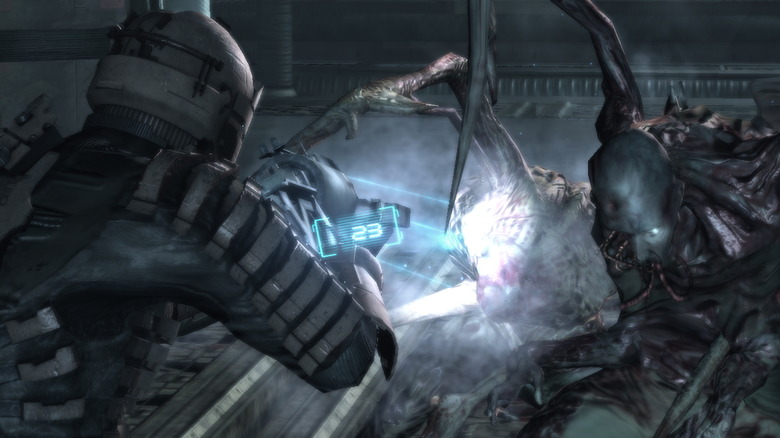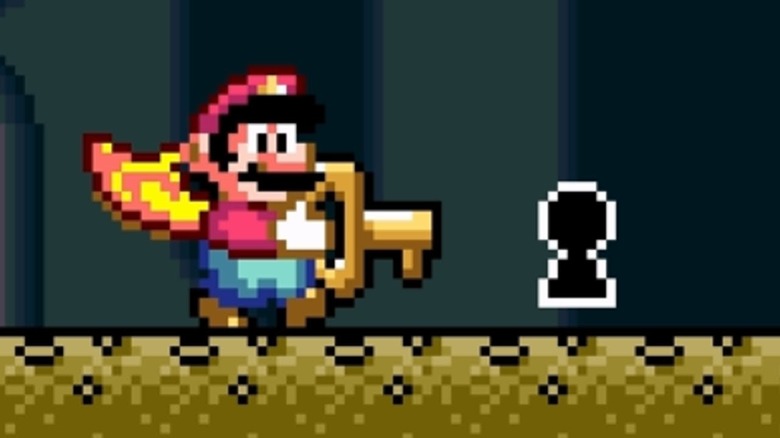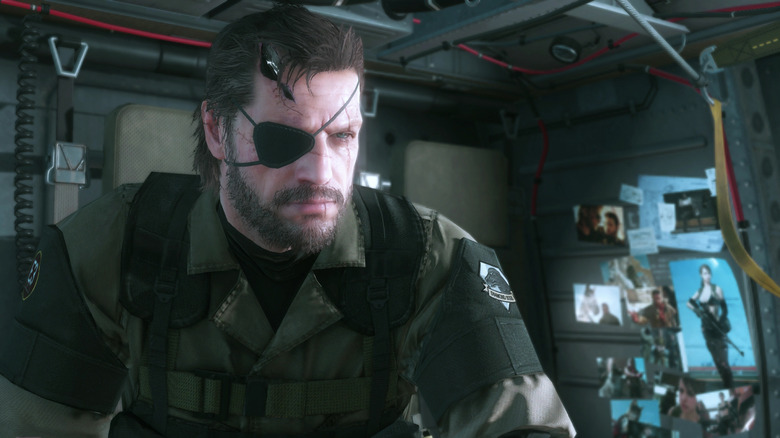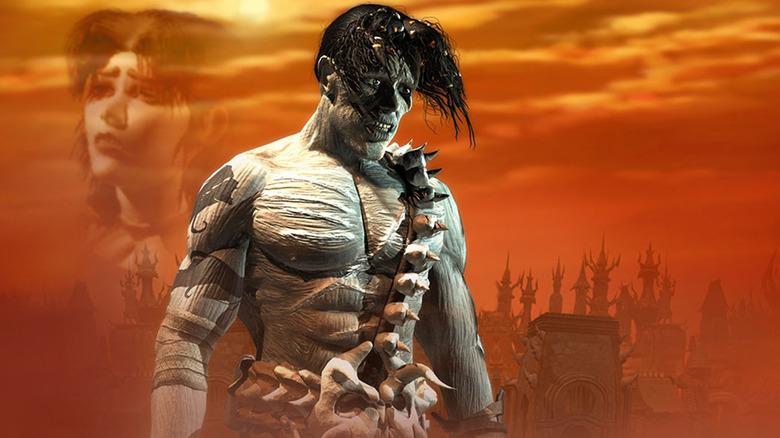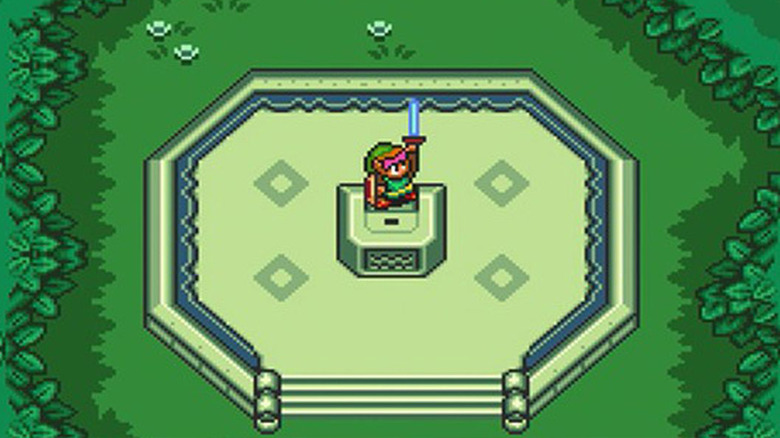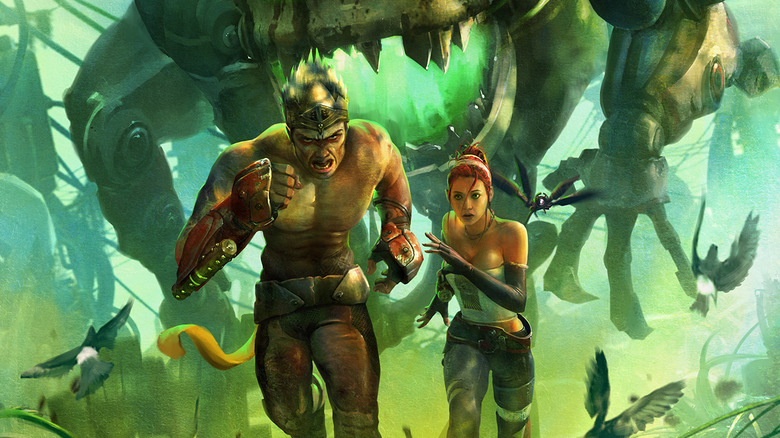Games You Need To Play Before You Die
Let's face it: considering the sheer volume of video games in the modern world and the relatively short length of the human lifespan, we simply don't have enough time to play all of those games before our own inevitable expiration date. Fun is important, time is fleeting, and the search for excellence is no small task. You're going to need to make some hard decisions. We've got you covered.
What makes a game truly great? Is it the mechanics? The art? The overall aesthetic? Perhaps a combination of all of these traits, fused with a certain undefinable something that stirs up a passion within our hearts and a desire to keep playing. From 16-bit retro platforming masterpieces to 3D RPG epics, here's a list of games you absolutely need to play before you die. Whether you're into dark explorations of the unknown or lighthearted romps through wild and crazy wonderlands, this list has something for you.
Dark Souls challenged how we define roleplaying
Along with Bloodborne, its nightmare-laden sister title by developer FromSoftware, the Dark Souls trilogy has become a subgenre in its own right, and inspired countless imitations. This can be attributed not only to the games' excellence, but to their accessibility; thanks to Bandai Namco, the first Dark Souls found an audience on each of the big three platforms of that generation — PlayStation 3, Xbox 360, and Windows PC. Seemingly overnight, the phrase "Prepare to Die" became synonymous with the industry's most challenging gameplay, most precise mechanics, and deepest, darkest lore.
That lore told of fallen gods waging an endless war against a dying race of immortal dragons, a story of humankind and its darkly hopeful — but ultimately fearful — nature. Dark Souls is an action-adventure RPG like no other, with a story that requires clever sleuthing (or a community of like-minded enthusiasts) to decipher. At the center of this lurks the game's brutally challenging reputation. As Keza MacDonald wrote at IGN, "Death is everything in Dark Souls. It's education, it's progress, it's the recurring stylistic and thematic motif that runs through all of its spectacularly varied, decaying and depraved environments ... Exactly because your chances of success are so slim, each victory feels monumental."
The Elder Scrolls V: Skyrim brought dragons to life
IGN called it "a rare kind of intensely personal, deeply rewarding experience, and one of the best role-playing games yet produced." GameSpot said it "performs the most spectacular of enchantments: the one that causes huge chunks of time to vanish before you know it." We say they're absolutely right. The Elder Scrolls V: Skyrim from Bethesda Game Studios has been capturing the hearts and minds of players since it was first released on the fortuitous date of 11/11/11, and there are no signs of stopping. Skyrim tells the immersive first-person RPG story of a fantasy empire on the edge. Tamriel's northern continent is besieged by an ancient, slumbering evil, and it's up to you — the last Dragonborn — to stop it. Plenty of dragons, vampires, fiends, and other astonishing creatures stand in your way.
It's easy to dismiss Skyrim's spectacle by suggesting it stands on the shoulder of giants. Indeed, each installment of the Elder Scrolls series prior to Skyrim represents a gaming milestone in its own right. But Brad Shoemaker's review for Giant Bomb perfectly captures the relentless enthusiasm so many of us share: "No other game I know of operates with this many moving parts to create such an immense world filled with this much choice in how you engage its excellent, endless fiction. It's one thing when a game offers dozens of hours of gameplay; it's quite another when that gameplay is good enough you'll want to live in its world for that long."
BioShock filled us with Rapture
BioShock from 2K Games is undeniably original. Long before Irrational Games would take us to the sky-high expanse of Columbia, we explored the lightless depths of Andrew Ryan's subaquatic city ironically known as Rapture. Billed as "a shooter unlike any you've ever played, loaded with weapons and tactics never seen," BioShock is an art deco FPS masterpiece full of mysteries, mayhem, and science fiction so astounding that it feels like magic. As players navigate Rapture's maniac-infested corridors beneath the sea, they'll discover the true nature of the city's founders — and what those secrets mean for the future of humanity amidst this bleak yet bombastic dystopia.
As Kristan Reed wrote for Eurogamer, "The hours spent playing this masterpiece were the perfect encapsulation of why videogaming is such a favorite waste of time for so many of us. Thrilling, terrifying, moving, confusing, amusing, compelling, and very very dark. BioShock isn't simply the sign of gaming realizing its true cinematic potential, but one where a game straddles so many entertainment art forms so expertly that it's the best demonstration yet how flexible this medium can be." He went on to say, "it's no longer just another shooter wrapped up in a pretty game engine, but a story that exists and unfolds inside the most convincing and elaborate and artistic game world ever conceived."
The Last of Us made us whole and broke our hearts
Awards aren't everything. But when your game is the winner of over 200 Game of the Year awards, that's a good sign that you've got something worth paying attention to. The Last of Us from Naughty Dog — the creators of Jak and Daxter and the fan-favorite Uncharted saga — is not only worth paying attention to, it's worth every ounce of your emotional energy (and it's guaranteed to take a lot). In The Last of Us, you'll explore a brutal post-pandemic world as you witness the story of two survivors and unlikely allies. Violent survivor Joel is hired to smuggle a 14-year-old girl known as Ellie out of an oppressive military quarantine zone. But the brief job quickly spirals into a harrowing trip across the entire United States as our heroes search for answers and a new way of life amidst a virulent hellscape of infected monstrosities.
With the incredible performances of leads Troy Baker and Ashley Johnson, the heart-wrenching narrative, the thrilling third-person action gameplay, and the tear-jerking score from composer Gustavo Santaolalla, The Last of Us is a triumph which truly represents Aristotle's classic idiom that the whole is greater than the sum of its parts. GamesRadar+ said, "Its storytelling is peerless, as affecting and multi-layered as it is grounded, underplayed, and real. In terms of everything the modern action game has strived to be, The Last of Us is the full-stop at the end of the sentence, leaving no more to be said."
Resident Evil 4 dug up the roots of all evil
Upon its release in 2005, Nintendo Power called Resident Evil 4 "possibly the best console video game ever made, and definitely the standard that horror titles will be measured by for years to come." That's a bold claim, but — while we're not ready to crown RE4 as the best of the best — we are most certainly ready to prop it up as a game you definitely want to play while the playing is good. The sixth release in Capcom's legendary survival horror franchise, Resident Evil 4 tells the macabre tale of special agent Leon Kennedy and his battle against the Umbrella Corporation's nefarious Las Plagas outbreak in Spain. After being sent on a mission to rescue the American president's kidnapped daughter, Leon manages to unravel the mysteries of the Los Illuminados cult (and even runs into his old pal Ada Wong).
What makes Resident Evil 4 so special? It's easy to say, but hard to capture. Something about that rural European village and its sordid inhabitants feels like it's pulled straight from the pages of a gothic horror novel, yet simultaneously captures the visceral, heart-pounding horror action of a John Carpenter film. As Games Radar maintains, "Simply put, Resident Evil 4 is the tightest, most accessible game in the series and one of the best games out there." IGN doubled down, saying, "[RE4] is simply the best survival horror game ever created ... You don't own Resident Evil 4. It owns you. An absolute must-have."
Castlevania: Symphony of the Night showed every side of the castle
Symphony of the Night is more than just the best game of the Castlevania series — its trademark blend of breakneck platformer action and nuanced RPG stats helped propel it to the status of genre-definer alongside Nintendo's Metroid. The "Metroidvania" subgenre is now a staple of modern arcade libraries and their would-be indie successors, and it's all thanks to Symphony of the Night's serendipitous blend of flawless game mechanics and inspired aesthetics. Since its release in 1997, SotN has been thrilling players with its epic setting and story. You play as Dracula's half-vampire son Alucard, who must use all his martial prowess and sorcery to survive the terrors of his father's titular nightmare castle and put and end to the undead nightmare. The pulse-pounding action brought to life by director/producer Toru Hagihara and the riveting score by composer Michiru Yamane are no less than legendary.
GamePro called Symphony of the Night "a mandatory addition to any Castlevania fan's game library." IGN particularly praised the score, saying, "the music is brilliant too — sometimes daunting, sometimes rousing, and always doing what music should — enhancing the action." But perhaps the review from the Official U.S. Playstation Magazine put it best: "Featuring a massive quest filled with RPG elements, mind-blowing 2D backgrounds, fantastic character artwork, an astounding soundtrack, and some of the best Castlevania gameplay ever seen, SotN is a PS One classic that can't be missed."
Dead Space showed us how gruesome horror can be
In a world of Silent Hills and Resident Evils, it takes a lot of effort, artistry, and luck for a survival horror game to stand out from the crowd. Enter Dead Space, from EA Redwood Shores. Under the leadership of Glen Schofield, the team at Redwood Shores (subsequently known as Visceral Games) labored to create a horror title that would both exemplify the dark sci-fi aesthetic of Doug Church and Warren Spector's System Shock and rival the industry standard at that time, Capcom's Resident Evil 4. And they did it.
Dead Space tells the story of engineer Isaac Clarke and his death-defying mission to survive the hideous Necromorph outbreak aboard the USG Ishimura, a derelict mining ship in deep orbit around an alien world. Simply put, it's incredible. Prior to Dead Space, the strongest contenders in the arena of sci-fi horror action were arguably id Software's Doom 3 and the Half-Life series from Valve Corporation. After Dead Space, others sought to emulate the groundbreaking dismemberment-based mechanical developments pioneered by Schofield's team of experts. GameSpot called Dead Space "an incredibly atmospheric and disturbingly gruesome deep-space adventure that will haunt your dreams and leave you begging for more." And, as Game Informer maintained, "If horror is your forte, dim the lights, crank up the surround sound, and take the deepest breath you ever have. I think you'll agree, no game has ever been this frightening."
Super Mario World taught us how to fly
When it hit North American shores alongside the launch of the Super Nintendo Entertainment System in 1991, Super Mario World promised legions of players "super power," and was one of the sparks that started the fire known as the console wars. Super Mario World took Nintendo's famous plumber brothers to Dinosaur Land for epic new adventures alongside new friends and a few familiar faces. Key to this was the dino companion Yoshi, whose dazzling array of new abilities wowed Mario enthusiasts from the word go. Whether he was gobbling up Koopa Troopa shells, carrying you on his back, or floating on feathered wings through the sky, Yoshi was an instant fan favorite, and has endured through the generations as a proper Nintendo mascot alongside Mario himself and the rest of the old gang.
Super Mario World was the game that promised to be "a bit more exciting, a bit more challenging, a bit more graphic, a bit more colorful ... a bit more Mario," a bit more everything. And it was. GameSpy maintained that Super Mario World is "as good as a platformer as we'll ever see," while Game Informer said it represented "the best of gaming." Fortunately for us, Super Mario World remains a flagship title for Nintendo's Virtual Console initiative, which means generations to come will be able to grab a Cape Feather and soar into their own worlds of adventure.
Metal Gear Solid V: The Phantom Pain was the epic end of an era
This action-adventure stealth game from Konami and developer Kojima Productions was the long-awaited culmination of the Metal Gear Solid series, and represents the high-water mark in this sci-fi-infused wartime tale of espionage, clones, and global conspiracies. On the heels of its companion title Metal Gear Solid V: Ground Zeroes, Metal Gear Solid V: The Phantom Pain was released to multiple platforms in September of 2015, and quickly took the gaming world by storm. On top of its immersive, stealth-based sandbox gameplay and cutting edge high-tech worldbuilding, The Phantom Pain offered players a much-needed denouement for a story that spanned multiple generations of console gameplay. Fans would finally come to understand the motivations of legendary hero Solid Snake, while taking the opportunity to play in the most realized version of his world ever created.
But you don't have to take our word for it. In his article suitably titled, "Metal Gear Solid V: The Phantom Pain is the Best Metal Gear Ever," Time's Matt Peckham maintained, "The holy grail of world-building games, it's argued, is a black box that lets players do as they like with minimal handholding. Pliability with just the right measure of accountability. Metal Gear Solid V: The Phantom Pain, a tactical stealth simulation wrapped in a colossal resource management puzzle inside a love letter to theatrical inscrutability, comes the closest ... to realizing that ideal."
Planescape: Torment took us to worlds undreamed of
If Dungeons & Dragons is your cup of tea, there is a veritable fountain of classic licensed computer titles available for your gaming enjoyment. Names like Eye of the Beholder, Pool of Radiance, and Balder's Gate are instantly recognizable by retro RPG enthusiasts, but one of these stands a cut above the rest. Planescape: Torment from Black Isle Studios and Interplay Entertainment hit Microsoft Windows in late 1999, and introduced fairweather RPG fans to the weird world of the Planescape licensed setting from D&D owners TSR. In Planescape: Torment, you play as the Nameless One, armed only with the fragile memory of your countless past lives. Together with your companions, you'll set off on an epic multiplanar adventure "from the dirty streets of Sigil into the mysterious Outer Planes and even into the depths of Hell itself."
Torment took the time-honored formula of traditional D&D and turned it on its head, presenting a story that was uniquely compelling and perfectly suited to showcase the extreme fantasy storytelling the medium was capable of. This is the title that PC Gamer called "One of the most inventive, entertaining RPGs ever created." Meanwhile, Game Revolution praised Torment's environmental audio: "The intermittent background music is great and the background noise is fantastic." But IGN summed it up nicely: "It's got enough depth to keep you entertained for a VERY long time ... and perhaps most importantly, it's a hell of a lot different than anything else that's ever been released."
The Legend of Zelda: A Link to the Past was the adventure of a lifetime
The Legend of Zelda: A Link to the Past is another generation-defining release that lives on during the age of Nintendo's Virtual Console. Eurogamer called it "the finest RPG/adventure the 16-bit era ever produced (even compared to the likes of Secret of Mana and Final Fantasy VI)," and with good reason — it represents the exquisite culmination of the inspired design philosophies first laid out by Shigeru Miyamoto and company in the original 8-bit Legend of Zelda back in 1986. Dark Souls director Hidetaka Miyazaki maintains that "The Legend of Zelda became a sort of textbook for 3D action games." If that's the case, we can consider A Link to the Past to be our textbook 2.0.
Featuring an impressive double-sided world map and a host of new enemies, items, sights, and sounds, A Link to the Past opened a new chapter in the saga and tells the story of a different Hylian adventurer named Link who must rise up against an evil wizard during a time untold. On top of its rich and mysterious story, ALttP introduced timeless innovations to the series like the Hookshot, Pegasus Boots, and Master Sword. NintendoWorldReport called A Link to the Past "a flawless masterpiece [that] drastically improved upon its predecessors by introducing a more linear framework for the player to explore (rather than the vast open-endedness of the two previous games), a better interface and controls, and dungeon puzzles and layouts designed in such a manner that can only be called perfect."
Enslaved: Odyssey to the West was a cinematic triumph
From the groundbreaking development team at Ninja Theory and the cinematic minds of Andy Serkis and Annihilation's Alex Garland came Enslaved: Odyssey to the West, a science fiction retelling of the great classical Chinese novel Journey to the West. This unassuming title from the makers of Heavenly Sword follows the "gripping, surprise-filled" journey of survivors Trip and Monkey as they make their way through a perilous, post-apocalyptic America. The complex relationship between these two characters is exemplified not only in their personalities, but in the game mechanics themselves. The technologically savvy Trip is a perfect compliment to Monkey's brutish strength and raw physicality, and the cinematic third-person action brings them together to create an astounding gameplay synergy that's rarely seen.
Screenwriter Alex Garland was tantamount to the game's narrative success. According to creative director Tameem Antoniades (via GameZone), "Effectively [Garland] became a level designer ... he wouldn't just give feedback on where the video lines should be placed, but also on the staging of the events, and how to add tension and drama through camera angles and music and so forth." The Guardian praised Enslaved's narrative, saying, "[The game] provides a rollercoaster adventure wrapped up in a brilliantly told story, which sees you grow as attached to the characters as they do to each other." And, according to Destructoid, "the game's eight- to ten-hour quest truly does feel like a journey, one that is compelling, exciting, and incredibly memorable."

